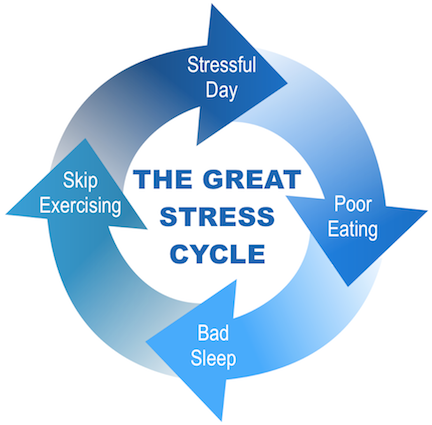
Insomnia is a sleeping disorder that prevents you from falling asleep, staying asleep, and waking up at an appropriate time. This can be due an underlying cause or seem idiopathic. If you struggle with sleep and are concerned you're the only one, it may help to know that you're not alone in your quest for better sleep. Research studies demonstrate that approximately 25% of people suffer from some form of sleep disorder. This statistic is daunting as sleep deprivation can impose detrimental effects on individuals and the people around them.
Lack of quality, sufficient sleep regularly can negatively impact your physical health, emotional well-being, and safety. Inadequate sleep can put you at greater risk for heart disease, high blood pressure, obesity, diabetes, and other serious illnesses. Therefore, it is important to get good sleep every night and build healthy sleep habits.
The National Institute of Neurological Disorders and Stroke reports that the amount of sleep each person needs varies with age. Babies typically need about 16 hours a day and teens should get around 9 hours of sleep each night. Most adults require 7 to 8 hours a night, although some people may need as few as 5 hours or as many as 10 hours of sleep each day.
When you get quality sleep on a regular basis, you'll...![]()
-
Wake up easily when the alarm goes off
-
Have quicker reflexes, clearer thought processes, a "spring in your step", and energy to spare
-
Have a more positive disposition
-
Reduce your risk for serious illnesses and accidents
Facts About Insomnia
Learning the facts about insomnia is important for improving overall sleep health. Insomnia is the most common of all sleep disorders.
Ten percent of these individuals have chronic insomnia. Lack of sleep is linked to many serious long-term health problems that can compromise physical health, emotional well-being, and overall quality of life.

What is Insomnia?
Insomnia is characterized by the inability to fall asleep, stay asleep, or both. The condition may also be present among individuals who consistently wake up several hours early and can't fall back asleep.
Generally, insomnia is categorized into one of three forms by the medical community. Transient insomnia lasts less than a week; short-term insomnia is one to three weeks in duration; and chronic insomnia persists for a month or longer.
In our 24/7 world, there just doesn't seem to be time for adequate sleep and rejuvenation. Yet, data shows that the health risks and financial costs of insomnia are too high to ignore. Here are some facts about insomnia:
Insomnia’s Impact on Individuals
-
Greater than one in four people have experienced insomnia sometime during their life. The condition affects people of all ages from children to older adults, though studies indicate 40% to 60% of people over 60 suffer from insomnia. In addition, the condition is twice as likely to occur in women than men.
-
People with chronic cases of insomnia have a significantly higher risk of having serious health conditions, including heart disease, stroke, high blood pressure, diabetes and depression.
People with insomnia have a better-than-average probability of falling victim to addictions such as alcoholism, drug abuse, and smoking. Moreover, studies have shown a propensity for insomnia among individuals who attempt suicide.
Sleeplessness is responsible for nearly 100,000 traffic accidents a year. These accidents also leave 1,550 people dead and 71,000 injured every year - and these are only using US figures.
Insomnia’s Economic Impact
-
Sleep deprivation costs U.S. companies nearly $150 billion in absenteeism and reduced productivity.
-
Sleep loss has a major effect on judgment and decision-making processes at work, particularly ones that require both emotional and mental ability.
-
Insomnia is responsible for nearly $14 billion in direct healthcare costs each year.
-
Employers spend approximately $3,200 more in healthcare costs on those with insomnia than on those who sleep well.
Whether you only suffer from the occasional sleepless night or have struggled for years with the condition, it's important to address what causes your insomnia before it negatively affects your health. Therefore, talk with your healthcare provider about addressing ways to get the sleep you need for optimal health and happiness.
Insomnia Statistics
Here are some general statistics about insomnia.
- People today sleep 20% less than they did 100 years ago.
- More than 30% of the population suffers from insomnia.
- One in three people suffer from some form of insomnia during their lifetime.
- More than half of Americans lose sleep due to stress and/or anxiety.
- Between 40% and 60% of people over the age of 60 suffer from insomnia.
- Women are up to twice as likely to suffer from insomnia than men.
- Approximately 35% of insomniacs have a family history of insomnia.
- 90% of people who suffer from depression also experience insomnia.
- Approximately 10 million people in the U.S. use prescription sleep aids.
- People who suffer from sleep deprivation are 27% more likely to become overweight or obese. There is also a link between weight gain and sleep apnea.
- A National Sleep Foundation Poll shows that 60% of people have driven while feeling sleepy (and 37% admit to having fallen asleep at the wheel) in the past year.
- A recent Consumer Reports survey showed the top reason couples gave for avoiding sex was "too tired or need sleep."

Financial Implications of Insomnia
The data surrounding insomnia isn't confined to the relationship between insomnia and health. This sleep disorder costs the government and industry billions of dollars a year.
- The Institute of Medicine estimates that hundreds of billions of dollars are spent annually on medical costs that are directly related to sleep disorders.
- The National Highway Traffic Safety Administration statistics show that 100,000 vehicle accidents occur annually drowsy driving. An estimated 1,500 die each year in these collisions.
- Employers spend approximately $3,200 more in healthcare costs on employees with sleep problems than for those who sleep well.
- According to the US Surgeon General, insomnia costs the U.S. Government more than $15 billion per year in health care costs.
- Statistics also show that the US industry loses about $150 billion each year because of sleep-deprived workers. This takes into account absenteeism and lost productivity.
These sobering statistics underscore the importance of enhancing sleep disorder awareness and why individuals need to seek immediate treatment for the health and well-being of others. Click the blue button below to schedule a sleep consultation today with one of our sleep specialists!

